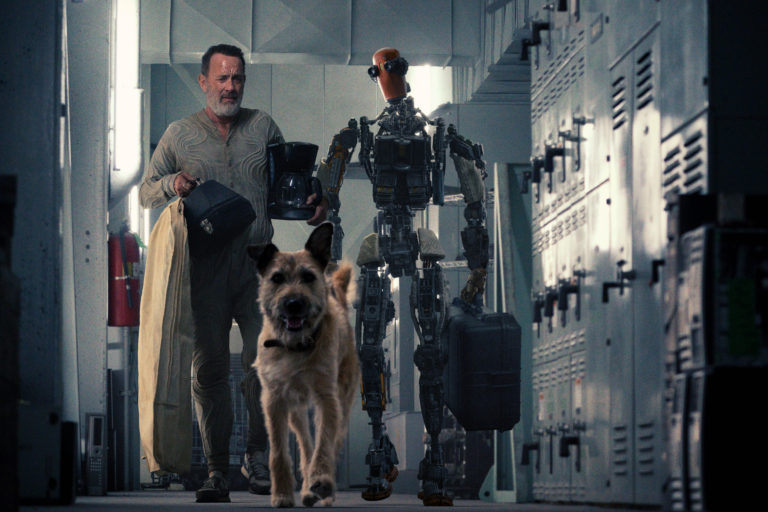A breezy if basic science fiction journey, Finch follows Tom Hanks traveling across an apocalyptic America to San Francisco with his dog and a robot in tow.
The story is aggressively straightforward, following the tried and true formula of having your characters need to get from Point A to Point B to give the film a purpose. Leading the way is Hanks as the titular Finch, a lonely and ailing man who may just be one of the last people left on Earth. Radiation sickness is slowly consuming him, leaving him wondering who will care for his beloved dog in the event of his death.
A quick reference to a solar flare provides a brief explanation as the precursor to humanity’s collapse. Of course, as with most apocalypse stories, the origin of the catastrophe matters less than what happens after the fabric of society frays. In this case, director Miguel Sapochnik portrays it as hopefully and positively as an apocalypse story can, maintaining a persistently light tone by initially focusing on humorous slapstick between Finch and his traveling companions. Although some darkness is sprinkled in, it mostly arrives as a downpour only as we get to the end of the journey.
The impetus for their sudden travel is because Finch’s home base was soon to be the site of an extreme weather event that would leave it uninhabitable. He therefore has only a handful of hours to pack up all the supplies he can and get an RV for a road trip. Along the way, he’ll have to weather the quite literal storms that come his way while raising the robot, Jeff, like a son in order to protect his dog.
The moments of danger on the journey that get loud and bombastic are less impactful as they teeter on the edge of being ridiculous. They become so excessive that it is hard to feel as though they are real. One scene where the RV is lifted into the sky strains credulity to a breaking point. However, a quieter moment where Finch demonstrates how the sun would burn his skin until he was fried alive is more terrifying because of how simple it is.
The hostility of the environment requires him to always stay inside or wear a protective suit whenever he has to go outside. The details of the world are solidly built and remain the best parts of the film. You see almost no other human beings for the entire runtime, leaving you with a profound sense of isolation. There is still a deep humanity to the story as conveyed through the robot Jeff, brilliantly voiced and played via motion capture by Caleb Landry Jones. His personality brings a lot of life to the role, making him both childlike and curious about the world around him.
He is similar to robots like Chappie though even more innocent and sweet. There is even a significant moment where he has a dream, excited about the future all three of them will have together. That future is still imbued with a looming tragedy as it becomes clear Finch is not long for this Earth. His declining health, shown through his frequent coughing up of blood, is a key aspect of the story. It establishes how in his final days he has begun to reflect on the life that he has led. What was the purpose of it all as he spent much of his life completely alone?
This ensures Hanks gets the chance to have multiple monologues in his textbook fashion. It is a role that isn’t outside the realm of much of his prior work and it feels much like riding a bike for the veteran actor. This isn’t to say it is bad, just familiar in execution and emotional range. What separates it is the robot and the apocalyptic setting, elevating it beyond a standard story. If anything, the last ten minutes or so make for the most interesting aspects of the film.
It would have been more engaging to have that be expanded and explored more deeply than just as a wrap up. Still, it closes on a more complicated and melancholic note that deserves points for trying something slightly different. The rest of the film, while certainly sturdy, doesn’t quite have what one for hope for when it comes to intrigue or imagination.
Finch is on Apple TV+ on November 5



